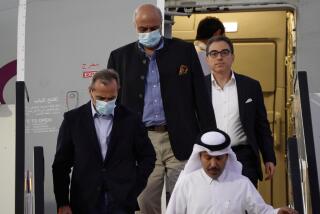World Bank OKs $231 Million in Loans to Iran Over U.S. Objections
- Share via
WASHINGTON — Ignoring strong U.S. objections, the World Bank on Thursday approved two loans to Iran totaling $231 million to be used for health care and sewage. The Clinton administration pushed hard for the vote to be deferred at least until after the controversial trial of 13 Jews on charges of spying for Israel.
U.S. officials blasted the decision to override Washington’s concerns.
“It’s U.S. policy and congressional mandate to oppose multilateral lending, including by the World Bank, to anyone on the list of state sponsors of terrorism, and that includes Iran,” a senior State Department official said. “We’re also concerned by the economic policy environment in Iran and have yet to see a commitment to the reforms necessary to encourage sustainable economic development.”
He called the timing of the vote “inappropriate” in light of the “show trial,” the recent shutdown of 17 reformist publications and other conservative measures designed to halt or reverse a wave of change that has swept through Iran since President Mohammad Khatami’s election in 1997.
The loans will be the first World Bank aid to Iran in seven years. A health-care improvement project will receive $86 million, while $145 million is designed for a sewage project in Tehran, Iran’s burgeoning capital.
The U.S.--the bank’s largest shareholder--voted against the loans, while Canada and France abstained. Afterward, World Bank President James Wolfensohn acknowledged that key shareholders had made clear their “deep concern with current events” in Iran and didn’t want the vote to be construed as support for the current situation.
He also said that Iran’s representative on the board had been instructed to inform Tehran of the World Bank’s concerns.
A representative for eight Nordic and Baltic countries later said the projects won approval because they are designed to help the poor. “These loans are uncontroversial and fairly straightforward,” said Anna Brandt.
The U.S. has been in an increasingly difficult position because its own initiative to better relations with the Islamic Republic after two decades of open hostility was followed almost immediately by a wave of crackdowns in Iran.
In March, Secretary of State Madeleine Albright announced a major overture designed to open up trade, expedite the settling of frozen assets dating back to the 1979 hostage drama and accelerate the renewal of formal diplomatic relations after 20 years of hostility.
As an initial step, she said the U.S. would lift sanctions banning imports of Iranian carpets, caviar, pistachios and dried fruit, Iran’s chief exports after petroleum. But the move stopped short of removing a similar ban on oil and gas, which account for more than 80% of Iranian exports.
The Clinton administration made the overture in part because of the overwhelming victory of reformers in February elections for parliament, which is scheduled to convene later this month. It was the third election in three years won decisively by reformers.
But in the interim, the conservative judiciary and the old parliament have initiated a series of moves--including nullifying some of the February election results--that U.S. officials believe are designed in part to prevent rapprochement.
More to Read
Sign up for Essential California
The most important California stories and recommendations in your inbox every morning.
You may occasionally receive promotional content from the Los Angeles Times.













